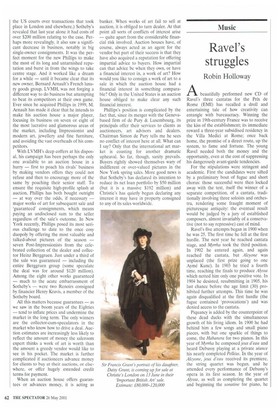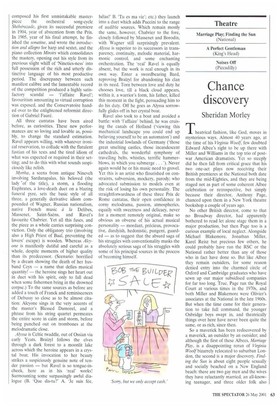Music
Ravel's struggles
Robin Holloway
Abeautifully performed new CD of Ravel's three cantatas for the Prix de Rome (EMI) has recalled a droll and entertaining tale of how creativity can entangle with bureaucracy. Winning the prize in 19th-century France was to receive the kiss of the establishment; its immediate reward a three-year subsidised residency in the Villa Medici at Rome; once back home, the promise of a direct route, up the system, to fame and fortune. The young Ravel needed both the money and the opportunity, even at the cost of suppressing his dangerously avant-garde tendencies.
For the stipulations were stringent and academic. First the candidates were sifted by a preliminary bout of fugue and short chorus: those successful were then locked away with the text, itself the winner of a separate competition, of a cantata, traditionally involving three soloists and orchestra, rendering some fraught moment of picturesque antiquity: the eventual result would be judged by a jury of established composers, almost invariably of a conservative (not to say repressive) cast of mind.
Ravel's five attempts began in 1900 when he was 25. The first time he fell at the first hurdle. The next year he reached cantata stage, and Myrrha took the third position. In 1902 he entered again, and again reached the cantata, but Alcyone was unplaced (the first prize going to one Ayme. Kunc). In 1903 he tried a fourth time, reaching the finals to produce Alyssa which netted him only one positive vote. In 1904 he desisted, resubmitting in 1905, his last chance before the age limit (30) prohibited further attempts. This time he was again disqualified at the first hurdle (the fugue contained 'provocations') and was denied access to the cantata.
Piquancy is added by the counterpoint of these dead ducks with the simultaneous growth of his living idiom. In 1900 he had behind him a few songs and small piano pieces, with but one sparkle of things to come, the Habanera for two pianos. In this year of Myrrha he composed jells d'eau and heard Debussy playing at a private seance his nearly completed Pelleas. In the year of Alcyone, jetec d'eau received its premiere, the string quartet was begun, and he attended every performance of Debussy's opera in its first season. In the year of Alyssa, as well as completing the quartet and beginning the sonatine for piano, he composed his first unmistakable master
piece the orchestral song-cycle Sheherazade, given its successful premiere in 1904, year of abstention from the Prix. In 1905, year of his final attempt, he finished the sonatine, and wrote the introduction and allegro for harp and sextet, and the piano collection Miroirs which consolidates the mastery, opening out his style from its previous slight whiff of 'Nineties-ness' into full possession of the rich and utterly distinctive language of his most productive period. The discrepancy between such manifest calibre and the lamentable record of the competition produced a highly satisfactory scandal — `l'affaire Ravel'; favouritism amounting to virtual corruption was exposed, and the Conservatoire handed over to the enlightened reformist direction of Gabriel Faure.
All three cantatas have been aired before, as curiosities. These new performances are so loving and lovable as, possibly, to change the standard estimation. Ravel appears willing, with whatever ironical reservation, to collude with the flatulent fustian of his texts and the tired idiom of what was expected or required in their setting; and to do this with what sounds suspiciously like relish.
Myrrha, a scena from antique Nineveh involving Sardanapalus, his beloved (the lady of the title), a storm, a flooding Euphrates, a love-death duet on a blazing funeral pyre, sets the basic style of all three, a generally derivative idiom compounded of Wagner, Russian nationalism, native French music a la Delibes, Massenet. Saint-Saens, and Ravel's favourite Chabrier. Yet all this fuses, and the piece as a whole carries surprising conviction. Only the obligatory trio (involving also a High Priest of Baal, preventing the lovers' escape) is wooden, Whereas Alcyone is manifestly dutiful and careful as a whole, despite moments of higher quality than its predecessor. (Scenario: horrified by a dream showing the death of her husband Ceyx — a name that defies musical quantity! — the heroine sings her heart out in duet with his spirit, only to fall dead when some fishermen bring in the drowned corpse.) To the same sources as before are added a touch of Franck and reminiscences of Debussy so close as to be almost citation: Alcyone sings in the very accents of the master's Blessed Damozel, and a phrase from his string quartet permeates the entire score in calm and storm, before being punched out on trombones at the melodramatic close.
Alyssa is Celtic twaddle, out of Ossian via early Yeats. Braizyl follows the elves through a dark forest to a moonlit lake across which the heroine appears in a crystal boat. His invocation to her beauty strikes a suspiciously genuine note of tender passion — but Ravel is so tongue-incheek, here as in his 'real' works! Surmounting some surpassingly awful dialogue (B. 'Que dis-tu?' A. `Je suis fee, helas!' B. `Tti es ma vie'; etc.) they launch into a duet which adds Puccini to the range of audible sources. Which remain mostly the same, however, Chabrier to the fore, closely followed by Massenet and Borodin, with Wagner still surprisingly prevalent. Alyssa is superior to its successors in transparency, continuity, melodic material, harmonic control, and some enchanting orchestration. The 'real' Ravel is equally absent, but the work is real enough in its own way. Enter a swordbearing Bard, reproving Braizyl for abandoning his clan in its need. Torn between love and duty he chooses love, till a black cloud appears, within it, a warrior's form, his father, killed this moment in the fight, persuading him to do his duty. Off he goes as Alyssa sorrowfully glides off in her crystal boat.
Ravel also took to a boat and avoided a battle: with l'affaire' behind, he was cruising the canals of Holland (viewing this mechanical landscape you could end up believing yourself to be an automaton') and the industrial lowlands of Germany (those great smelting castles, those incandescent cathedrals, the wonderful symphony of travelling belts, whistles, terrific hammerblows, in which you submerge . . . '). Never again would he or his music need to grovel. Yet this is an artist who flourished on constraints, subversion, mockery, parody; who advocated submission to models even at the risk of losing his own personality. The straightforwardness of these three Prix de Rome cantatas, their open confidence in corny melodrama, passion, atmospherics, equally with sweetness and delicacy, never for a moment remotely original, make so obvious an obverse of his actual musical personality — mordant, precieux, provocative, dandyish, hedonistic, pungent, guarded — as to suggest that the absurd saga of his struggles with conventionality masks the absolutely serious saga of his struggles with some of his principal sources in the process of becoming himself.



















































































 Previous page
Previous page